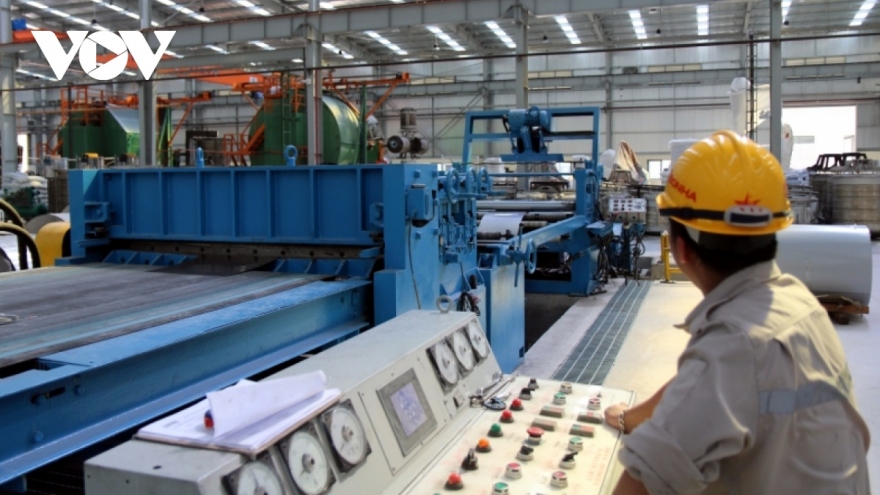Connecting Vietnam and the world: where business opportunities abound
VOV.VN - Home to a population of 100 million people, Vietnam is among Asia's top five countries expected to record the fastest growth in terms of consumer markets, said Tim Evans, Chief Executive Officer of HSBC Vietnam, in an exclusive article granted to CafeF.

Southeast Asia boasts a growing, young, and digitally-connected population and is emerging as an important growth engine within the global economy. The 10 countries that make up ASEAN are home to a combined population of 660 million people and together make up the world’s fifth-largest economy. While growth is cooling elsewhere, ASEAN is on track to expand by 4.6% this year to become the fourth-largest economy in the world by 2030.
The country has become known for its rapid economic growth, also standing out as one of the top performers in the region given its strong economic resilience both during and after the COVID-19 pandemic. Its economic resilience is among the top key attractions for international businesses as they seek to expand. With the most difficult period of time now in the past, what can Vietnam offer to remain an ideal destination for investors from all over the world?
The power of free trade
Tariff-free trade has always been an important factor in the appeal of the Vietnamese market, with the country's involvment in a number of significant free trade agreements (FTAs) making it among most open economies in ther world. Indeed, these FTAs are instrumental to the growth of businesses, as well as to Vietnam itself.
With a market of nearly 500 million people and 13.5% of global GDP, the Comprehensive and Progressive Agreement for Trans-Pacific Partnership (CPTPP) is a significant development for the country. Officially coming into force on 14 January, 2019, the CTPPP removes 95% of tariff between its 11 members and provides local businesses with wider access to new markets such as Canada, Mexico, and Peru. The Ministry of Planning and Investment forecast that the CPTPP will serve to increase Vietnamese GDP and exports by 1.3% and 4.04% by 2035, respectively, creating about 20,000 to 26,000 new jobs on average per annum.
On the other hand, businesses in other CPTPP economies such as the UK will in turn have greater access to the Vietnamese market. Indeed, UK-based pharmaceutical giant AstraZeneca has already co-operated with the Vietnamese Government on disease prevention and control, pharmaceutical research, development and production, and sustainable health system development.
According to information provided by a HSBC Global Connections survey conducted in July and August on over 3,500 businesses based in nine markets, 67% of international companies intend to take advantage of the CPTPP, up from 55% in 2022. Similarly, 66% intend to use the Regional Comprehensive Economic Partnership (RCEP), compared to 53% in 2022.
Officially coming into force in January, 2022, the RCEP is of the same importance to the nation, eliminating tariffs in certain sectors, with the top beneficiaries being F&B, petroleum, and meat. The RCEP not only brings further trade opportunities to the country, but also cements its position as a manufacturing hub in Asia. HSBC's research found that companies from China mainland (80%) are most interested in making use of RCEP, followed by those from Australia (74%).
While companies in the Asia-Pacific region see the RCEP as especially beneficial, French firms are particularly interested in using the EU-Vietnam partnership. Overall, 63% of companies in HSBC's survey intend to make use of the EU-Vietnam Free Trade Agreement, which entered into force in August, 2020, with the goal of eliminating 99% of tariffs and reducing trade frictions between the two partners. The strong interest in the FTAs that the nation is involved in reflects its importance in global trade flows.
A promising consumption story
The international companies participating in HSBC's survey consistently cite the country’s competitive wage and skilled workforce as being the most attractive factors for business expansion. Compared with other countries in Asia such as China, the Republic of Korea, and Japan, the country boasts a relatively younger workforce. Indeed, its able and affordable workforce is clearly attractive to global manufacturers. And that's not all.
Home to a population of 100 million people, Vietnam is among Asia's top five countries expected to see the fastest growth in their consumer markets. According to World Data Lab, in 2024 alone the nation will have four million more people joining the middle class and by 2030 there will be an additional 23.2 million people. Currently, the upper middle class, individuals earning between US$50 and US$110 per day, in the country is expected to grow by an average of 17% per annum until the end of this decade. The nation is therefore set to become the 10th largest global consumer market, bigger than Germany or the UK.
The large population of relatively young people with monthly average spending per capita rose by 74% between 2012 and 2022, thereby strongly supporting the country's consumption story. Even COVID-19 could not do a challenge when Vietnam has seen punchy recovery in consumption, with retail sales reached around 20% higher than before the pandemic, making it top two economy leading ASEAN's retail sales recovery.
All of this provides a great deal of investment opportunities for companies who intend to tap into the rising middle class in the nation.
This year, the country has witnessed a number of retailers such as Lotte, Central Group, and Aeon Mall opening new malls and supermarkets. The number of modern retail stores like convenience stores are also increasing fast, transforming the way people shop and boosting the growth of retail industry.
The total retail sales of consumer goods and services rose 9.4% on-year in the first 10 months of the year according to Vietnam's General Statistics Office. The Ministry of Industry and Trade therefore expects the Vietnamese retail market to reach US$350 billion by 2025.
The digital connectivity
Moreover, 23% of business decision-makers said the growing digital economy drew them to Vietnam amid digital infrastructure expanding rapidly. This is backed up by the determination of the Vietnamese government in digital infrastructure development as set out in the draft national digital infrastructure strategy through 2025, with vision towards 2030, recently released by the Ministry of Information and Communications (MOIC). Its ambition includes becoming top 50 countries in the Information and Communications Technology (ICT) Development Index by 2025 and among the top 30 in the Digital Infrastructure Development Index by 2030.
Insider Intelligence forecasts local smartphones users will reach 67.3 million by 2026, thereby accounting for 96.9% of Internet users. This digital literate population is an instrumental enabler for the country's e-commerce sector which saw a 20% growth in 2022. It is therefore expected to post revenue of USD20.5 billion this year, translating to 25% on-year growth according to the Vietnam E-Commerce Report 2023 compiled by the Vietnam E-Commerce and Digital Economy Agency of the Ministry of Industry and Trade.
The sustainability ambition
The country has been listed by the World Bank as one of the five countries that will be worst-affected by climate change. At the same time, it ranks among the world's top four highest and most dependent coal users in International Energy Agency’s Coal Transitions Exposure Index. It is therefore logical for the Vietnamese Government to announce its target to achieve net zero by 2050 to double down on energy transition as the sector accounts for more than half of its greenhouse gas emissions. This bold commitment itself opens numerous opportunities for the country and international investors as well.
According to Vietnam’s Power Development Plan VIII (PDP8), the investment needed for power sector development alone to 2030 is estimated to be at USD134.5 billion. The amount for just energy transition is even larger. The announcement of Vietnam Just Energy Transition Partnership in December last year, which expects to mobilise US$15 billion to support the country's ambition, will help to address this gap and also to create business opportunities.
Companies operating in the country are alert to ESG issues and are therefore investing in sustainability, with even those who have not had any presence here looking into possibilities in the field. In early November, an UK Energy Mission of 14 firms came to the nation to seek further co-operation opportunities arising from the local energy transition process. They have chosen Vietnam as a priority destination to expand their operations in the Asia-Pacific region.
Conclusion
For nearly half a decade, in both my current and previous roles, I have witnessed Vietnam go through both ups and downs. What I have noticed, is that regardless of the challenges in front of it, Vietnam always bounces back. Even during the very darkest hours of the COVID pandemic, I was struck by the incredible resilience of the people and that was in turn reflected in the broader economy. Across the HSBC global network, we observe, that businesses are still very enthusiastic about opportunities that Vietnam offers. The data from the recent HSBC Global Connections survey reinforces this observation: 53% businesses operating in the country are prioritizing growth over the next two years. Among firms who are not yet established operations in Vietnam, there is still strong interest to participate in the Vietnam story.
Times may be challenging at the moment, but throughout its history, Viet Nam has shown a remarkable ability to recover and rebuild. The Vietnamese people have a strong sense of national identity and a deep-rooted spirit of perseverance. This spirit will see Vietnam through the current short term challenges and the country and its people remain well placed to capture the opportunities that will arise when the global economic environment becomes more favourable.


